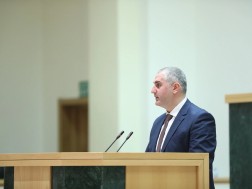Tbilisi (GBC) - Falling commodity indexes, active tourism, remittances, which strengthens the GEL and directly affects imported inflation.
The NBG Governor answered the parliamentarians about the expectations of a significant decrease in inflation. What factors give the NBG hope that inflation will approach the target next year? Among these factors is the tightening of monetary policy, which will be maintained until expectations are reduced.
Koba Gvenetadze said that analysis of current data is more important than forecasts, which is not justified in many countries under the conditions of uncertainty, on the basis of which macroprudential measures are taken.
NBG Governor stated the importance of regulations in the individual cases when the MP change is ineffective and cannot curb inflation.
Koba Gvenetadze said about the prudent policy of NBG. It was ahead of other countries in implementing macroprudential measures.
He spoke about measures to limit lending, among which was the shortening of foreign currency mortgages and consumer loans. Decreasing the reserve requirement in GEL, which increases the cost of raising currency.
“I am proud to say that this flexible basket was not available until 2016, which allows for recalibration along with calibration. That is, if it is tightened too much, it will be eased (periodically changing the parameters).
Exogenous factors account for 6% of inflation (10.6%) (including the cost of transportation, which has a decreasing trend and will gradually be transferred to Georgia as well). These factors include 0.5% - the impact of the rent price, which is related to migration. This helps the economic growth of the country. At the same time, it increases aggregate demand, which has a negative effect on domestic inflation. In response, the NBG maintains a stricter policy.
The strengthening of the exchange rate helps the imported inflation. At the same time, it increases aggregate demand, which has a negative effect on local inflation”, - the NBG Governor said.





















